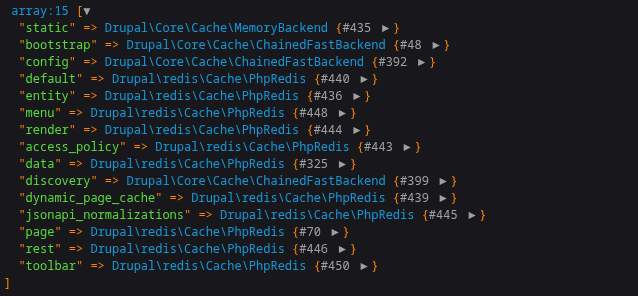Drupal offers several caching systems, including APCu and backend.
For applications developed under Drupal, particular emphasis must be placed on caching, and Redis is a high-performance system that already has a module to facilitate its integration and configuration.
Server-level installation
sudo apt install redis-server php8.3-redisInstallation on Drupal:
composer require 'drupal/redis:^1.10'
Vendor/bin/drush en redisServer-level configuration: /etc/redis/redis.conf
bind 127.0.0.1
port 6379
maxmemory 4GB # 10-15% de la RAM totale
maxmemory-policy allkeys-lru # Éviction LRU si mémoire pleine
save "" # Désactive la persistance (optionnel pour cache)
requirepass "votre_mot_de_passe_secure" # Sécurité !Start redis:
sudo systemctl restart redis-server
sudo systemctl enable redis-server
Configuration in Drupal's settings.php file:
/**
* Configuring PhpRedis
*/
// ////////////////////////
// Enable Redis for cache/sessions/locks
$settings['redis.connection']['interface'] = 'PhpRedis';
$settings['redis.connection']['host'] = '127.0.0.1';
$settings['redis.connection']['password'] = 'your_password';
$settings['redis.connection']['port'] = 6379;
$settings['redis.connection']['persistent'] = TRUE;
// Default cache (main bins)
$settings['cache']['default'] = 'cache.backend.redis';
/**
* Getting started with Drupal.
*/
// Booting the Drupal kernel (using ACPu if available).
$settings['cache']['bins']['bootstrap'] = 'cache.backend.chainedfast';
// Active configuration (YAML imported into DB)
$settings['cache']['bins']['config'] = 'cache.backend.chainedfast';
// Discovering plugins
$settings['cache']['bins']['discovery'] = 'cache.backend.chainedfast';
/**
* Heavy bin
*/
$settings['cache']['bins']['render'] = 'cache.backend.redis';
$settings['cache']['bins']['page'] = 'cache.backend.redis';
// Redis sessions (optional but recommended for consistency)
$settings['session_storage']['container'] = 'session.storage.redis';
$settings['redis_serialization_php_igbinary'] = TRUE; # If igbinary is installed
// Redis locks (avoids cluster conflicts)
$settings['container_yamls'][] = 'modules/contrib/redis/example.services.yml';
$settings['container_yamls'][] = 'modules/contrib/redis/redis.services.yml';Verify that the Redis cache is being used correctly:
dd(\Drupal\Core\Cache\Cache::getBins());
Some useful commands for redis
To connect:
redis-cliLog in (replace [password] with your password):
127.0.0.1:6379> AUTH [password]Exit:
127.0.0.1:6379> QUIT#Displays the number of stored keys:
127.0.0.1:6379> DBSIZE
#information about memory:
127.0.0.1:6379> INFO memory
#Scan the data:
127.0.0.1:6379> SCAN 0 MATCH drupal* COUNT 50
Loading ...




